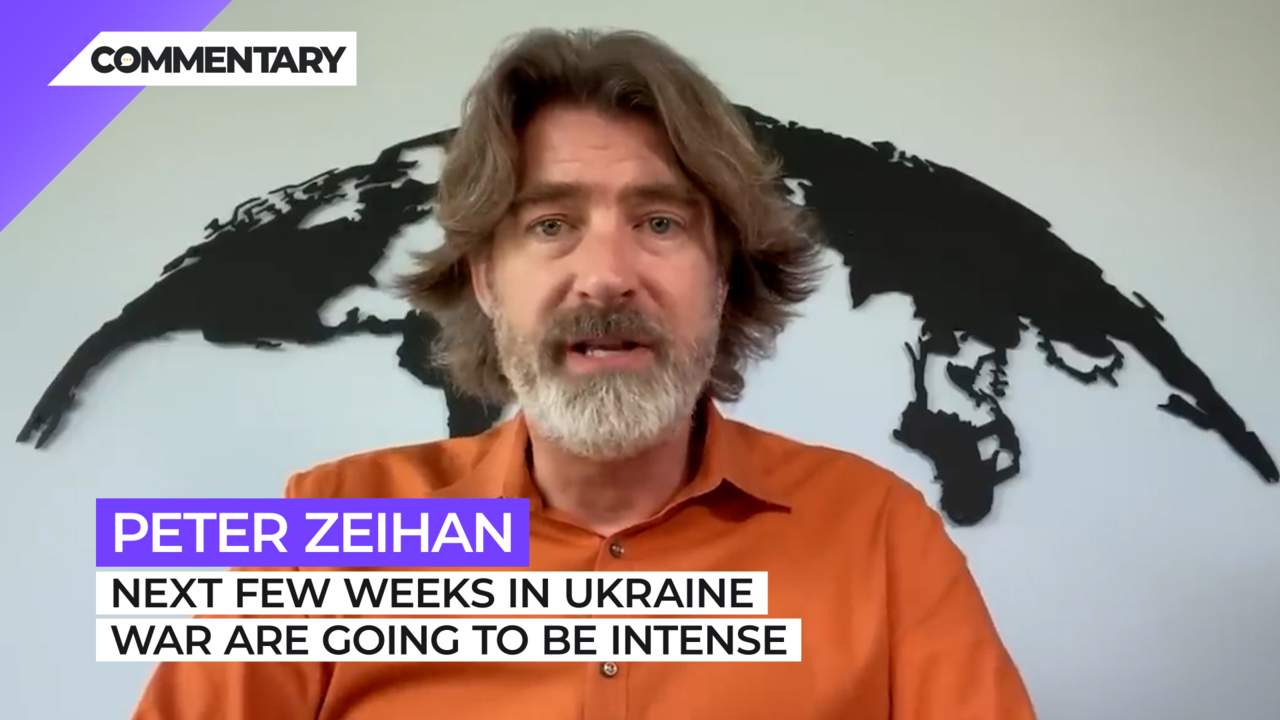
Commentary
-
Our commentary partners will help you reach your own conclusions on complex topics.
Hey, everyone, Peter Zeihan here coming to you from home in Colorado. A lot of things are going on right now. And over the weekend there were two major developments I’m just kind of merge into one video log. So first of all on Saturday, the 18th. The Lithuanians, in essence shut down the rail line that links the enclave of Kaliningrad, so Russian territory on the Baltic Sea, from Russia proper. Specifically, they say they are now enforcing international European sanctions on Kaliningrad as a separate entity, since it is physically separated. And this basically means that even if you could get something in Russia, you now have to go through an international link to get to Kaliningrad and vice versa, since that goes through Lithuania and its international space, that’s a different sovereign country. The sanctions now apply. So about two thirds of the economic activity between Kaliningrad and Russia proper passes on that rail line, the other third goes by ship, and probably half of that cargo overall now falls afoul of the sanctions, whether it’s because of finance or technology or energy or whatever it happens to be. Now Kaliningrad is a weird little pocket of territory in northern Europe. It used to be the easternmost position of German power, it was part of Prussia. It was a military base that they used to project power east and north and in the aftermath of the world wars, it became Soviet territory. And because under the Soviet Union, all of the republics were in a single country, it really didn’t matter that it was never formally incorporated into, say, Latvia, Poland, it was instead part of Russia proper. But on a map, it didn’t matter. When independence for the former Soviet world happened in 1999, or 1989 to 1982. However, Poland and Lithuania went their own way. And now Colin Colin, Greg became physically isolated. Now, the Clinton graders and the Russians are saying that they’re going to get around this by just having more vessels take maritime shipments from Kaliningrad up through the northern Baltic Sea into the Gulf of Finland into St. Petersburg. doesn’t work as well as you might think. Having a small population like Kirtland ground, only about a million people physically separated. But having that dedicated rail line you know that broadly works. It’s awkward and causes a series of diplomatic crises. But it physically works. You theoretically could do this by water. The problem is that the water is not only available, now Poland and Estonia and Latvia and Lithuania and Denmark and Germany, other Baltics equatorial seats, states are all in NATO already. And Finland and Sweden are on their way to join in pretty quickly. So really the only chunk of the Baltic that is not NATO is going to be Russia proper. And in that sort of environment having an exposed supply line is at at a minimum dubious, but it’s more than that. There’s also a climate issue. Unlike most of the bays of the world, the Baltic Sea countries, Sweden, Finland, the Baltic states, northern Russia, all of them get a lot of precipitation, most of that ends up in the Baltics, specifically in the northern arm called the Gulf of Bothnia and the eastern Gulf of Finland. So Bothy and Finland freeze over regularly, and in fact, Stockholm in Sweden in Riga and Latvia are where they are, because that’s the furthest south that the freeze line normally goes to. Kaliningrad is south of that they don’t freeze, but Petersburg is definitely on the north side. So if you’re moving into an environment where you’re shipping things by water through a NATO lake that freezes over for a couple of months of the year, that does not strike me as a very viable option. The Russians are already shooting solid gold kittens over this Kaliningrad is incredibly exposed. And while NATO has always been nervous about it, because they see it as a dagger at Europe’s heart, and it is it’s also completely surrounded now by hostile states. And in any sort of meaningful conflict between Russia and NATO Kaliningrad would probably fall in a matter of days, if not hours. So the Russians are doing what the Russians can. They can’t get troops there because you’d never be able to get troops on that railing. And you know, Mayville transport is never been the Russians forte, they may be able to fly in some paratroopers, but that’s not going to really dissuade anyone to do anything differently. And they can’t move regular forces because they’re all committed on the Ukraine front. Their only option is to put in missiles. There are already Iskender medium range, ballistic missiles with nuclear tips, they’re already count on the Russians to put in a lot more and to beat their chests about how they can incinerate European cities. Specifically, the extenders are designed to be able to hit
Rome and Berlin and London and Paris. Yeah, okay. So that’s that piece of the second big thing that’s going weigh in on is it between sanctions and some difficulties out of the Russians in trying to make life for the Europeans as difficult for their sanctions as possible. Natural gas flows from Russia to Europe proper are down by about a third right now, with most of the recent reductions being reductions in the Nord Stream one pipeline, this is a pipeline that was operational about 10 to 10 years ago, Nord Stream two is going to come online this year, but because of the war, that’s been indefinitely shelved. Now, there’s a lot of inconsistencies in European energy policy. And how the way it’s manifesting at the immediate moment is that the Germans because they’re facing immediate natural gas shortages now are discovering that they have to go back to coal in a very big way. And they announced their plans to do that this weekend. A lot of greens in everywhere are already condemning the Germans, but it’s worth picking apart what’s going on with European energy policy here, because it’s a lot worse than most people are suggesting. The Europeans didn’t start importing natural gas in mass until really the 1980s. And now imports are over half of total consumption. And that makes it sound better than it is because most of those domestic domestically produced European production, I’m sorry, the domestically produced stuff, the stuff that comes from within Europe, most of its not within the EU. And most of that comes from Norway with a little bit coming from the United Kingdom as well. So when you say that imports are half, it’s related, the imports are 80%. And about half of that comes from Russia. So the degree of exposure here really is high. Also, a number of the European countries have steadily pushed nucular out of their fuel mix for political reasons, some one little fun thing to keep in mind that the origin of the anti nucular protests in Europe and in the United States in the 1960s and 1970s. That was an FSB operation. So the roots of today’s German Green Party in particular are rooted in Russian propaganda, it’s moved on and taken a life of their own. So I don’t mean to suggest that the Russians are puppeteering the German greens right now. But you know, there is a background there, that is worth acknowledging when you’re making policy that really hasn’t been to this point. So then there’s the possibility of green tech, solar and wind. But Europe is neither a windy nor a particularly sunny continent. And most of the green tech that has been installed at this point at high cost I might add has been very seriously underperforming. There are three countries on the continent that have decent potential, make that for Denmark and the United Kingdom have really good wind potential, specifically offshore, and both of them get a significant percentage of their electricity from that source group. But remember, the UK left the EU, so you can’t count UK data in that anymore. And that was about 1/3 of the US plan for going green was power from the UK. Second is Greece. Greece has great offshore wind as well, but it’s freaking Greece. And no one wants to invest a trillion dollars in generating infrastructure in a country that is already on financial drip feed and has no hope of long term survival. And then the third one is Spain, which has pretty good solar. The problem is that Spain is almost completely disconnected from the broader European grid, there’s minimal pipe and electricity transmission across the French Spanish border, they’re building it up. And at current rates, you know, maybe that’ll be really impressive in 10 to 15 years. But even if Spain becomes a massive solar producer, that helps France, which is not one of the countries that has a problem here. So without those, those four states or at least the the three bigger ones, you know, there’s not much else going on here. The Germans like to say that they’re building up all this green tech and on paper, they now have solar and wind capacity installed, that nameplate capacity is capable of generating twice the electricity that they need for their peak demand. The problem is that the country is both calm and cloudy. So it generates only a spare a few percentage points of what it’s capable of. And in the US accounting chicanery to make it look better than it is. So for example, on those six days in August, when everyone in Germany is on vacation, and the industrial plant is shut down,
and the sun finally comes out. The Germans generate huge amounts of electricity far more than they could ever need themselves and so they export it. Those exports are counted as domestic consumption in terms of the amount of electricity that is generated from green sources. Similarly for most of the year when it’s cloudy and the solar is pointless, they use coal plants to generate a lot Electricity, but they only count the coal generated electricity that comes at the time when it’s actually directly linked up to the grid. When the sun goes down, or sorry, when the sun comes up and they do get some solar, the coal is immediately disconnected from the grid and the solar is given privileged access to the grid. It takes 36 to 48 hours to spin up or spin down in coal, lignite power plant love the kinds of the Germans have. So when solar displaces they don’t count the coal generated electricity in their numbers. So that depresses the coal figures and increases artificially, the green tech figures, probably they’re only getting about 10% of their electricity by a more standard accounting method from green sources. Anyway, natural gas has definitely not been provided in the volumes are the reliability that enables most of the European economic system, especially the electrical grid to function and the way it was designed. And so what the Germans are doing right now and removing natural gas from the mix, because they have no choice and putting coal back in some version of this is now going to happen across most of Europe. And that has three big outcomes. Number one, it means you have minimal natural gas allowed to be used to generate electricity, it is now going to be mostly hoarded for industrial use. Second, there’s not enough even for that, or there won’t be soon because even if this little spat is resolved, there’s going to be another one and the natural gas that’s transported by pipe across Ukraine that is not long for this world. So what natural gas they can get access to is going to have to be hoarded and reserved for industrial use. And then it’s going to have to be rationed for the industrial sector. Now that suggests that what is already an energy induced recession in Europe is about to expand becoming broader industrial recession, that will last a significant amount of time, because there just isn’t a good alternative at all. And then third, of course, absolutely massive coal buildup across Europe starting in Germany, but But continuing on, which will completely obliterate Europe’s climate goals, even with more accounting, creativity. Alright, those are the two big things, there’s more things going on. So buckle up the next few weeks in regards to the Ukraine war are going to be particularly intense. We have European insurance sanctions on Russian oil exports that are now in place, so we’re probably going to see NATO navies seizing Russian oil tankers before too long. The World Food Program is loudly and accurately screaming about famine starting this year in a number of countries. And if anything, they’re not thinking loud enough, about half of the foodstuffs that the W F p distributes to the poor countries of the world that are food insecure. That comes from Ukraine and they can’t get any. And we’re also seeing significant weakness in the weapons flows from the west to Ukraine. Some of its bureaucratic some of its political, some of its logistical. Some of it is just because some countries in NATO are starting to run it out. In the meantime, the Russians are rushing hundreds, maybe even a couple of 1000 older tanks to the front. So we are setting up to have a clash between the Ukrainians and the Russians that will face will have Russians with outdated, poorly maintained equipment manned by low morale, poorly trained troops facing the ground off against Ukrainian infantry that has minimal weapons at all. It’s going to be an ugly end of summer over there. All right. That is it from me apologize for this one being so long, but you know holidays, and I will see you all next time. Until then.
-
How could RFK Jr. impact 2024 election?
Many Americans speculated about how a potential RFK, Jr. campaign might impact the 2024 elections. While RFK is neither a Democrat nor a Republican, many of his positions favor Donald Trump’s base over Joe Biden’s, particularly his various conspiracy theories on a wide range of subjects. Straight Arrow News contributor Peter Zeihan says that GOP…
-
Global warming won’t impact Russian-Chinese shipping
The seas above Russia’s northern coastline are too frozen for shipping, but some have wondered whether global warming might change that in the decades to come. If those seas were to become navigable for commercial shipping, new direct routes between Russia and China could theoretically open up. Straight Arrow News contributor Peter Zeihan throws more…
-
Can other nations replicate success of US shale revolution?
The “shale revolution” has provided the United States with a bountiful domestic supply of oil. But extracting oil from shale is a highly technical process, and it is also dependent on specific geological formations. Straight Arrow News contributor Peter Zeihan tackles the question of whether or not other nations might be able to replicate the…
-
Peace between Israel and Iran, at least for now
A series of recent airstrikes between Israel and Iran inflamed fears of a wider regional war erupting in the Middle East. That concern now seems to have paid off, after third-party countries around the world successfully intervened and talked down military hardliners in both Israel and Iran in order to avoid such an outcome. Israel’s…
-
Global internet in a precarious state, but that could be a positive
Over 500 underwater cables span over 870,000 miles worldwide, serving as the foundation of the modern global internet. Despite their critical role in facilitating communication, these cables often go unnoticed, even as the amount of data transmitted through them has surged. So what happens if the cables fail? Straight Arrow News contributor Peter Zeihan contends…
Latest Stories
-
 Getty Images
Getty Images
Biden uses NFL draft ad to try to connect with young voters
-
 Getty Images
Getty Images
Powering pot: Energy for US cannabis industry could electrify 13.5M homes
-
 Getty Images
Getty Images
Allies plan for Trump to have more control over interest rates
-
 Getty Images
Getty Images
FDA: Bird flu found in 1/5 commercial milk samples, suggests greater spread
-
 Reuters
Reuters
China permanently deploys warships to second overseas base
Popular Opinions
-
In addition to the facts, we believe it’s vital to hear perspectives from all sides of the political spectrum.
Latest Opinions
In addition to the facts, we believe it’s vital to hear perspectives from all sides of the political spectrum. We hope these different voices will help you reach your own conclusions.
The opinions published in this section are solely those of the contributors and do not reflect the views of Straight Arrow News.

















Latest Commentary
We know it is important to hear from a diverse range of observers on the complex topics we face and believe our commentary partners will help you reach your own conclusions.
The commentaries published in this section are solely those of the contributors and do not reflect the views of Straight Arrow News.
Peter Zeihan
Geopolitical StrategistGlobal warming won’t impact Russian-Chinese shipping
Can other nations replicate success of US shale revolution?
Peace between Israel and Iran, at least for now
Dr. Frank Luntz
Pollster and Political Analyst‘Take the job seriously’: Why Americans are fed up with Congress
‘If we can shrink it, it will stop growing’: Americans talk debt, deficit
‘I don’t think they care’: Undecided voters explain their reasons
Pete Ricketts
U.S. Senator for Nebraska